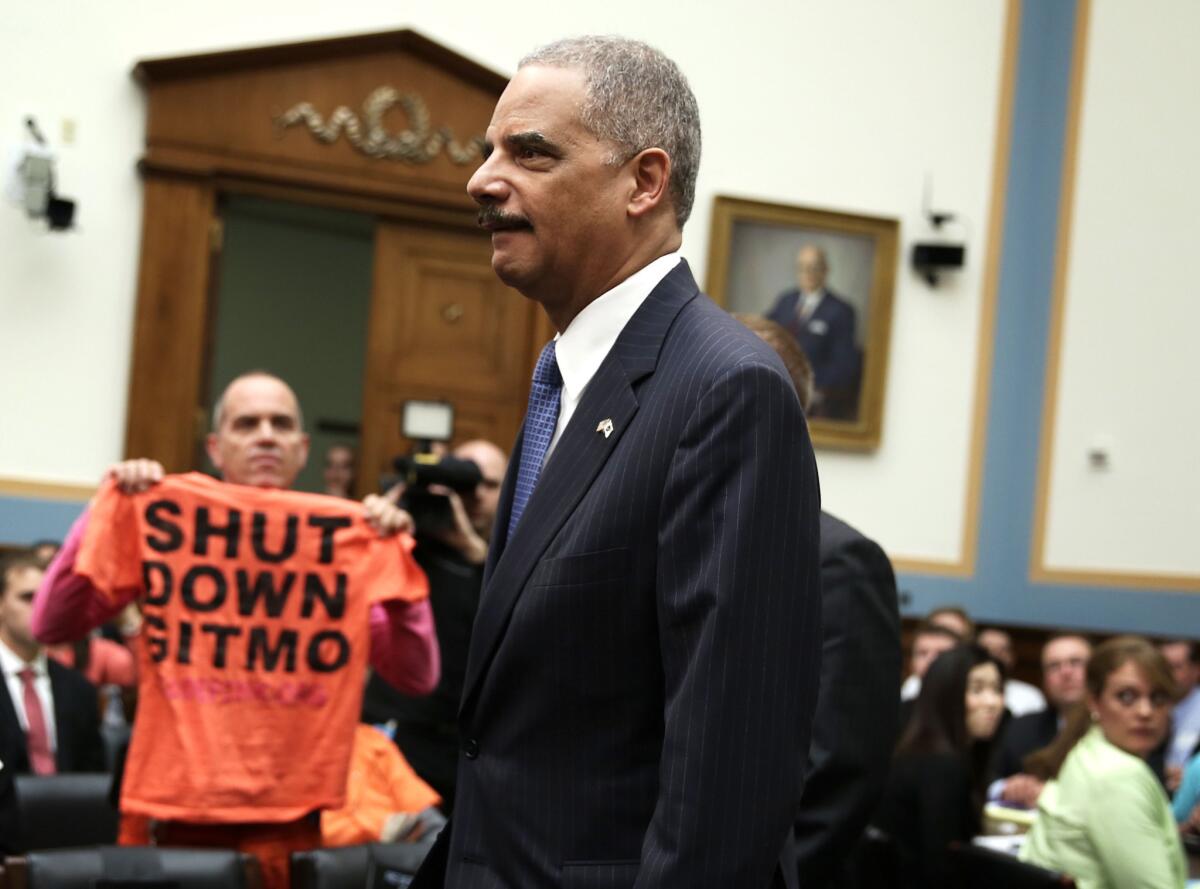Hunger strike, Yemeni dilemma could spur Guantanamo closure plans

A 100-day-old hunger strike at the Guantanamo Bay prison for suspected terrorists has agitated international human rights advocates anew, prompting fresh calls worldwide for closure of the detention center that President Obama vowed to shutter more than three years ago.
The European Parliament, the United Nations’ human rights commissioner, the Inter-American Commission on Human Rights and U.S.-allied governments with citizens stuck in indefinite detention have stepped up criticism of conditions they see as driving desperate captives to starve themselves.
In spite of obstacles thrown up by Congress and defenders of the offshore anti-terrorism operations, changing politics in the Islamic world may give Obama a new chance to make good on his overdue promise.
Most of the 166 men still imprisoned at the U.S. naval base in southern Cuba are Yemenis -- at least 88, by the Yemeni government’s count, plus a few Saudis of Yemeni descent. Of the 86 prisoners approved by a presidential task force four years ago for transfer out of Gitmo, 59 are Yemenis -- and their new government wants them back.
U.S.-Yemeni relations were far more contentious in the early days of the Guantanamo operations, when then-President Ali Abdullah Saleh turned a blind eye to radical Islamic forces as they set up the group Al Qaeda in the Arabian Peninsula in Yemen’s hinterlands to plot terrorist strikes and train militants.
Now, after Saleh’s U.S.-engineered departure and the emergence of a more collaborative leadership under President Abdu Rabu Mansour Hadi, Yemeni officials have been lobbying Washington to return their countrymen from Guantanamo.
“Was Saleh flip-flopping? Yes,” a Yemeni government official conceded privately to The Times. “But the political will [to cooperate with the United States] is there now.”
With so much of the Gitmo population hailing from Yemen, any sizable repatriation would go far toward emptying out the maligned offshore prison and could provide important momentum for its closure.
As his first official act as president in January 2009, Obama ordered the closure of Guantanamo within a year and the review of each detainee’s case to determine whether to prosecute, repatriate or continue to detain the prisoner indefinitely if there were concerns the captive would pose a security risk if freed.
Transfer of cleared Yemeni prisoners was just about to get underway when Nigerian underwear bomber Umar Farouk Abdulmutallab attempted to blow up a Detroit-bound airliner on Christmas Day 2009. That prompted the Obama administration to impose a moratorium on the transfers because the Nigerian had been trained and inspired by militants in Yemen.
Family members of Yemeni prisoners have been staging demonstrations in recent weeks, demanding return of relatives they fear could die in the hunger strike, which began Feb. 6 in protest of alleged mishandling of the Koran by U.S. soldiers searching their cells. On Thursday, a spokesman for the joint task force operating the prison said 102 detainees were now taking part in the strike and 30 were being force-fed through tubes.
Lawyers for the prisoners, who have been under virtual lockdown for most of the last three months, say their clients’ refusal of food is their sole means of drawing world attention to unjust detention -- in many cases for more than 10 years.
The moratorium on Yemeni transfers is “a self-inflicted injury” by the Obama administration on the image and efficacy of U.S. justice, said Omar Farah, an attorney with the Center for Constitutional Rights in Washington who represents four Yemeni detainees.
“There’s no other way to look at it than as a crude form of collective punishment” in halting the repatriation of all Yemeni prisoners because of an attempted terrorist strike by someone else, Farah said.
“There can be no genuine discussion of living up to the president’s promise to close the prison until he squarely addresses the Yemeni dimension of the problem,” Farah said.
Transferring the dozens of Yemenis already deemed of little or no threat is the appropriate first step back onto the path of closing Guantanamo, said Laura Pitter, an attorney and counter-terrorism advisor with Human Rights Watch.
Rights advocates point to the Yemeni government’s creation of a human rights committee and plans to help returning prisoners reintegrate in their homeland as evidence that the leadership there is working diligently to assuage U.S. fears of militant recidivism -- or of unjustly detained Yemenis seeking revenge for their treatment.
Obama initiated a new push to close Guantanamo this month when he lashed out at its costs and the international scorn it continues to heap on the United States. He has been encouraged by some congressional and government leaders to take action to end the hunger strike before it adds detainee deaths to the global outrage. Sen. Dianne Feinstein (D-Calif.), head of the Senate Intelligence Committee, urged Obama late last month to reconsider the blocked Yemeni transfers. And Atty. Gen. Eric H. Holder Jr. indicated at a Capitol Hill hearing Wednesday that the fate of the Yemenis was being reviewed.
Hadi, the Yemeni president, was in Washington last fall to lobby for the return of his imprisoned countrymen, and other officials in Sana have been meeting with U.S. counterparts to press for an end to the moratorium, said Mohammed Albasha, spokesman for the Yemeni Embassy in Washington.
“I have said from the first,” Albasha said, “that if you solve the Yemeni issue, you solve Guantanamo.”
ALSO:
U.S. announces new sanctions against Syria
Six Americans among at least 15 killed in Afghanistan bombing
Hundreds oppose China refinery project in mostly peaceful protests
A foreign correspondent for 25 years, Carol J. Williams traveled to and reported from more than 80 countries in Europe, Asia, the Middle East and Latin America.
More to Read
Start your day right
Sign up for Essential California for news, features and recommendations from the L.A. Times and beyond in your inbox six days a week.
You may occasionally receive promotional content from the Los Angeles Times.







